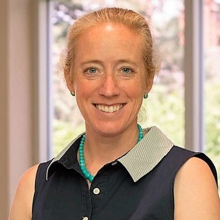April 2017 Spotlight on the SRCD Policy Fellow: Emily Douglas, Ph.D.
2016-2017 Federal Congressional Policy Fellow
As a Congressional fellow I am working in the office of Senator Ron Wyden (Oregon), but primarily doing work for the Senate Finance Committee (SFC). Senator Wyden is “ranking member” for the SFC, which means that he holds the highest seat that a senator who is in the minority can hold. My background is in social welfare policy – especially child welfare – and the SFC handles, or has jurisdiction over, many of the policies and programs that I have studied and taught for over a decade.
I am a mid-career policy fellow. Doing a policy fellowship had been on my radar since I was in graduate school, over 15 years ago, but it was never the right time, personally or professionally until now. In fact, I sat down with my dean in 2011 and mapped out what would be the best time to apply for the fellowship and I selected 2016-2017 as the possible fellowship year for me. Since SRCD provides stipends for fellows (through funding for the fellowship that SRCD is fortunate to receive from foundations and through funding SRCD provides as a match to foundation funding), I have taken a complete leave of absence from my university for the 2016-2017 academic year.
I have always been interested in the connection between research and policy and how our government programs support, or sometimes fail to provide the right kind of support, to maximize child and family well-being. My undergraduate degree is in psychology, both of my graduate degrees are in public policy, and I have been a fulltime faculty member in a school of social work for over a decade—teaching in both the policy and research sequences in social work education. Prior to becoming a policy fellow, I had experience speaking at state houses, serving on a state-level legislative committee, and in giving invited testimony before the Congressionally-created Commission to End Child Abuse and Neglect Fatalities.
One of my main areas of expertise is children who die from abuse or neglect. I have dedicated significant portions of my career to working on, studying this problem, and in examining our policy, program, and professional responses to this issue. During the process of when Congressional fellows are matched with offices for placements, I was lucky to have a Congressional staffer, who was working on a special investigation into children’s deaths in foster care, seek me out. I was quickly placed in that office and have since been working on this special investigation during my fellowship. I have also been helping to write a new child welfare bill that responds to this special investigation, as well as many long-standing concerns within the child welfare space. I have been extremely lucky to be able to use my academic expertise in such an applied manner in Washington.
A fellowship also allows time to attend briefings, workshops, and trainings both on and off of Capitol Hill. It also provides a wealth of opportunity to connect with people from varied backgrounds, but who work in the same space – individuals professional societies, advocacy organizations, research firms, and think tanks. There’s a reason why they say that everyone is in Washington – it’s because everyone’s in Washington!
What has impressed me most about being a fellow and having exposure to policymaking in Washington, is that everyone is so open. Congressional staffers want to learn from “experts” in the field. They spend their days trying to understand social problems from the perspectives of those experiencing them or the professional working with them. Further, staffers seek to understand the barriers of what prevent professionals from providing the best care, attention, and treatment to those in need and they balance that with what they know about federal law, regulations, and what is politically feasible at any given time. The staffers with whom I have worked have deep areas of expertise and yet they remain open to hearing about new problems and in seeking out what is the best, possible evidence to overcome, or at least begin to address those problems. I have found the U.S. Senate an inspiring place to be!
